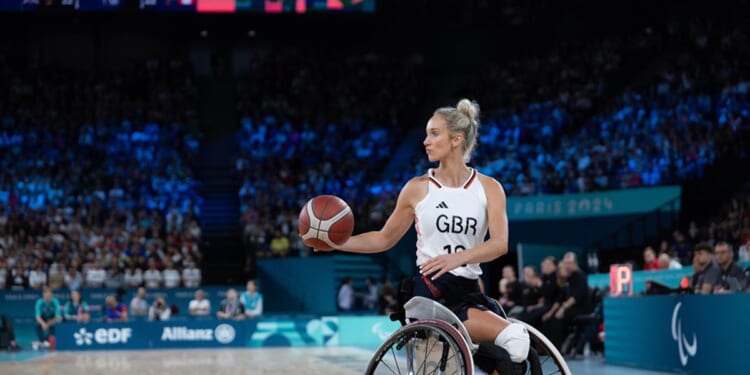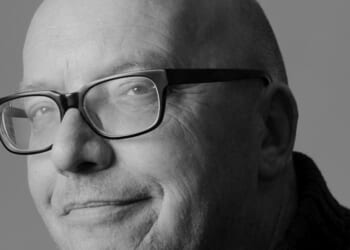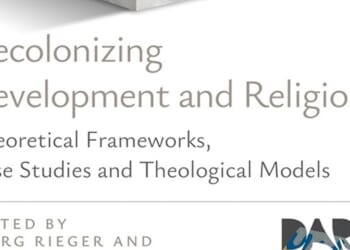AS AN amputee, the four-time Paralympic basketball player Amy Conroy knows the challenges that disabled children can face. After surviving childhood cancer, she found confidence and purpose through sport, and has recently become an ambassador for the Christian charity International Needs UK (IN UK).
She refers to her faith as a huge motivator and inspiration, but it developed alongside extreme trauma and loss. When she was seven years old, Miss Conroy’s mother died from breast cancer.
“She was only 39, and had been unwell for a large part of my life,” she says. “My dad, Chris, looked after her as she was suffering before she passed away. And he raised us, my sister and I, and worked full time. I saw how steadfast he was, and he remained the kindest person. He never gave up, and has always been my role model and the source of my strength. His faith has definitely shaped mine.”
As the family came to terms with their loss, Chris took his daughters to the Roman Catholic cathedral in Norwich every week. “Sometimes, when he needed to, he’d bribe us with a chocolate cookie when we got back,” Miss Conroy says. “He still goes there now, and spends a lot of his time volunteering.”
When she was 12 years old, Miss Conroy was diagnosed with bone cancer. “It started with a pain in my knee, and it took a year for me to be diagnosed with osteosarcoma. By that stage, it had spread to my spine and my lungs. The odds of me surviving weren’t great.
“There were times when it was quite scary, and my dad must have felt helpless, but he never lost hope, and I’m sure that’s because of his faith.
“There was one time I remember so clearly: it was the night before the amputation of my leg, when I was 12. I was really scared, and Dad sat and prayed with me. I had such an intense feeling of calm and peace that I’ve never had since. It’s hard to put into words but the next morning I was wheeled into that surgery, with a deep belief that everything was going to be absolutely fine.”
She describes it as “an incredible feeling; one I’ve never experienced since in quite the same way. I haven’t over-analysed it. I’ve always thought that it was a time I really needed help, and it came.
“The whole experience taught me a lot about positivity,” she says. “Dad and I were trying to be strong for each other, and I learnt that, if you narrate the situation around you, you can control your interpretation of things. We were always trying to keep hope and a kind of happiness and sense of humour wherever we could.
“Dad would run bingo sessions on the ward. We’d all be in our beds, and kids were being sick throughout. Doctors would be coming in, and the prizes were terrible. But I remember we all had the time of our lives. You can find happiness anywhere if you look hard enough.”
AS SHE reflects on that time, Ms Conroy acknowledges the suffering of the children on the ward. “I was in hospital for a year,” she says. “The severity of the situation always hit home whenever a kid died.”
The treatment itself was gruelling. The chemotherapy that she had — and responded well to — caused intense vomiting. “The first day, I was sick 75 times. I stopped counting after that. I couldn’t talk. I just lay there with my sick bowl. It was relentless. There were lots of surgeries and scares during treatment, and, by the end, I was tired.”
She reflects on the part played by her faith, and the challenges that it presented. “A few times, I prayed, begged God, for just one break a day where I didn’t feel sick, and that never happened. So, there were times where I did ask ‘Why?’ And I have asked that since. But it’s been Dad’s way of thinking and his faith that has always brought me back.
“If ever I’m frustrated, thinking ‘I’ve prayed about this. Why is it not working? Why is God not helping?’, my dad reminds me that God has his own timeline. He encourages me to pray for strength to get through things instead. I’ve been incredibly lucky to have been fine since I left hospital. Sarcomas don’t always have a great outcome for kids.”
Going back to school after treatment was a shock to the system. “I was excited to be back, and so grateful to be alive,” she says. “But friends had moved on. We now had very different perspectives on life, and, while everyone was supportive, school wasn’t accessible for me. I couldn’t get in any of the classrooms.
“I’d loved sport, pre-cancer, but now I was the only disabled person in my school. I remember thinking that disability was such a negative thing that it was going to hold me back. That’s why I’m so passionate about working with IN UK.”
Miss Conroy is supporting the charity’s Disability Inclusion Project in Uganda, launching “Sports for Change”, an initiative to empower the participation of disabled children. The project seeks to raise more than £330,000 over the next three years, and Miss Conroy will lead fund-raising with IN’s December’s Christmas Challenge, with The Big Give match-funding campaign.
She says: “My faith teaches me that every child is created equal, and deserves the chance to flourish. Sport gave me back my independence, and I believe God can use it to open doors for children everywhere.
“At first, I didn’t accept my disability. I didn’t know anyone with disability. I was very self-conscious. I owe such a huge thank you to sport, and basketball, to help me realise disabilities don’t have to hold you back.”
HER entry into sports came when her father took her to a local taster day for wheelchair basketball. “I think he noticed I’d lost the kind of confidence and spark I used to have,” she recalls. “I hated it at first, and I was terrible. But I kept going back. And, gradually, that spark returned. Being in a chair felt free: I could fly around, with nothing holding me back.
“In life and society, there can be barriers and stigmas. People assume you’re less capable, and there are random stairs everywhere, but, on court, it felt like a sanctuary. And I saw the GB basketball wheelchair women on TV, and they looked so confident, powerful, and impressive. Something clicked in me, and I thought ‘I’m going to give it everything to be like them.’
“I’ve now competed in four Paralympics and a whole load of World Championships and Europeans. Basketball takes up most of my life. My sister and I are just launching a business called Squadgames, which will offer wheelchair-basketball team-bonding days for companies. The great thing about the sport is it’s such an authentic catalyst for inclusion, because everyone’s on a level playing field.”
The Disability Inclusion Project is a locally led initiative, driven by Ugandan partners (International Needs Uganda), and works with disabled children, their parents, teachers, and communities.
“The leaders in Uganda identify what the problems are,” Miss Conroy says, “and the team here fund-raises and supports them with solutions.” She gives an example: “Having a ramp to get into your classroom would change the life of these kids. And they’re also working to challenge the societal kind of views of disability — for example, of it being a curse. Many disabled children are hidden away and lack access to education, medical care, and mobility aids.”
She recalls one who was “initially very shy and self-conscious, and by the end, they wanted to be captain of the volleyball team. They’re in a wheelchair, and everyone was fighting for who got to push the wheelchair rather than it being something that would be hidden away.
“At another school, IN UK was working with a young person who had an idea that the entire school should learn sign language — and it happened. It’s not just inclusion: it’s actual participation. So I’m very excited to be involved, and I’m looking forward to supporting with fund-raising to enable these projects to take place.”
Faith remains an important part of Miss Conroy’s life and mission. “Sometimes, I fall into the trap of life being really busy, with so many goals, and it’s something that always keeps me grounded, something I always come back to.
“I’ve just finished taking part in an Alpha course, and am looking for a new church in the area I’ve just moved to. In church communities, I always find everyone has such gorgeous, kind energy. It’s one of my happiest places.”
International Needs UK is a worldwide Christian mission and development agency, working in partnership with leaders in 33 countries around the world to help families to live life in all its fullness, inspired by John 10.10.
More information about the Uganda project can be found at: ineeds.org.uk

















